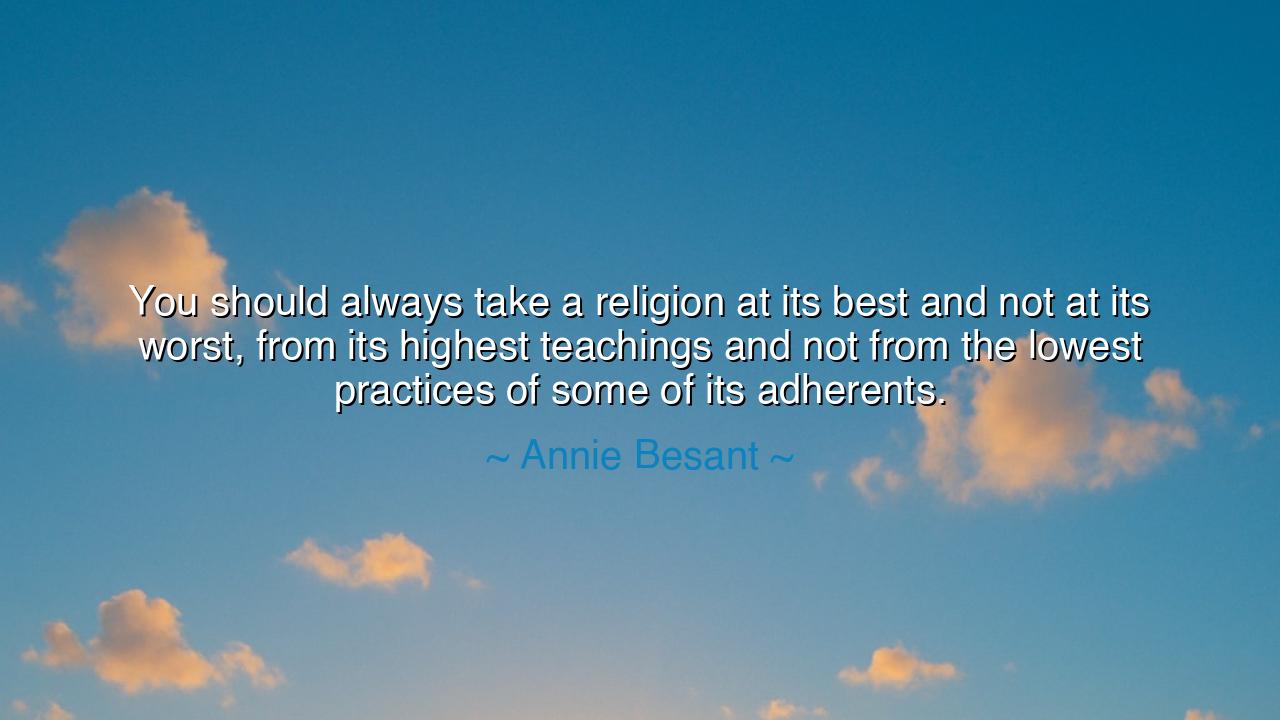
You should always take a religion at its best and not at its
You should always take a religion at its best and not at its worst, from its highest teachings and not from the lowest practices of some of its adherents.






Hear, O seeker of wisdom, the voice of Annie Besant, who walked boldly across the fields of faith and philosophy, declaring: “You should always take a religion at its best and not at its worst, from its highest teachings and not from the lowest practices of some of its adherents.” These words shine like a lantern in the darkness of misunderstanding. For religion, like all human endeavors, is a vessel that carries both gold and dross, both the shining ideals of the spirit and the stumbling errors of frail humanity.
Consider this truth: every religion at its best speaks of love, justice, compassion, and reverence for the Eternal. Yet men and women, weak in discipline, clouded by pride, often twist these teachings to serve their own desires. Wars are waged in the name of peace, cruelty is justified in the name of God, and prejudice is cloaked in sacred language. If one were to judge a faith by these lowest expressions, one would see only distortion, never the pure light. Thus Besant counsels us: look not to the failures of adherents, but to the highest ideals their tradition proclaims.
History offers us a clear example. In the name of Christianity, crusaders once bathed cities in blood, and inquisitors bound the innocent in chains. Yet if one turns to the highest teachings of Christ, one finds love of neighbor, mercy to the poor, forgiveness of enemies. The fault lies not in the teachings but in the hearts of those who wielded them without wisdom. To judge the religion solely by the cruelty of some adherents would be to miss the divine fragrance hidden within its garden.
So too with Islam. Many in the modern world have judged it by the violence of a few, yet its highest vision is one of peace, of surrender to God’s will, of care for the orphan and the traveler. To understand Islam at its best, one must hear the Prophet’s words of mercy, his call to justice, his insistence on charity. Besant’s wisdom bids us to rise above prejudice, to see beyond the failures of men, and to measure a faith by the nobility of its message rather than the weakness of its followers.
This teaching is not only about religion, but about all human institutions. Governments fall into corruption, yet their ideals may be noble. Families may wound one another, yet the call of kinship remains sacred. If you judge only by the failures, you will never see the hidden strength. The wise seek the highest teachings always, for it is there that the essence of truth dwells.
The lesson for us is simple yet profound: when you encounter a faith, a culture, or even a person, do not rush to judge them by their lowest acts. Seek instead the noblest truth they strive for, and hold them to that. In this way, you cultivate compassion rather than scorn, understanding rather than division. For when you see people at their best, you also call them to rise higher, to live more fully in the light of their own ideals.
Practical counsel follows: when you hear of a religion, do not take your knowledge from rumors or from the anger of its worst examples. Read its scriptures, listen to its wisest teachers, observe the lives of those who embody its gentlest spirit. Do the same with people: seek their noblest intentions, not only their mistakes. By doing this, you train your own heart to look for light rather than darkness, and to lift others rather than condemn them.
Therefore, O traveler of the ages, remember Annie Besant’s wisdom: take a religion at its best, not at its worst; measure it by its highest teachings, not by the lowest practices of its adherents. In this way, your vision will be clear, your judgment merciful, and your soul uplifted. And by seeing the best in others, you will awaken the best within yourself, becoming not a divider of men but a uniter, not a judge of flaws but a herald of hope.






AAdministratorAdministrator
Welcome, honored guests. Please leave a comment, we will respond soon